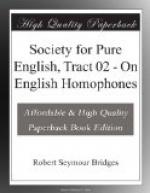PILL = to plunder.
PINK = ornamental slashing of dress.
POKE = pocket.
POLL = to cut the hair.
QUARRY (as used in sport).
QUEAN = a woman.
RACK (of clouds).
RAZE (to the ground).
The meaning being the very opposite of
raise, the word raze
is intolerable.
REDE = counsel, n.b. change of meaning.
RHEUM: survives in rheumatic, &c.
SCALD = scurvy (adj.).
SLEAVE = a skein of silk,
‘The ravelled sleave of care’,
usually misinterpreted, the
equivocal alternative making
excellent sense.
SOUSE (verb): of a bird of prey swooping.
SPEED: as in ‘St. Francis be thy speed’ = help, aid.
STALE = bait or decoy (well lost).
TARRE: to ‘tarre a dog on’ = incite.
TICKLE = unstable.
TIRE = to dress (the hair, &c.).
VAIL = to let fall.
WREAK.
Besides the above may be noted
WONT (sub.): lost in won’t = will not.
FAIR: Though we still speak of ‘a fair complexion’ the word has lost much of its old use: and the verb TO FARE has suffered; we still say ‘Farewell’, but scarcely ’he fares ill’; also TO FARE FORTH is obsolete.
BOLT = to sift, has gone out, also BOLT in the sense of a missile weapon; but the weapon may have gone first; we still preserve it in ‘a bolt from the blue’, a thunder-bolt, and ’a fool’s bolt is soon shot’, and we shoot the bolt of a door.
BARM: this being the name of an object which would be familiar only to brewers and bakers, probably suffered from the discontinuance of family brewing and baking. It would no longer be familiar, and may possibly have felt the blurring effect of the ill-defined BALM, which word also seems rarely used. In the South of England few persons now know what barm is.
ARCH: adj., probably obsolescent.
There are also examples of words with the affix a-, or initials simulating that affix, thus:
ABY: lost in abide, with which it was confused.
ABODE = bode (? whether ever in common use).
ACCITE: lost in excite.
ASSAY: quite a common word, lost in say (?)
ATONE: lost in tone.
and thus attempt, attaint, attest, avail, all suffered from tempt, taint, test, veil, whereas attend seems to have destroyed tend.
Table of homophones that may seem to be presently falling out of use.[15]




